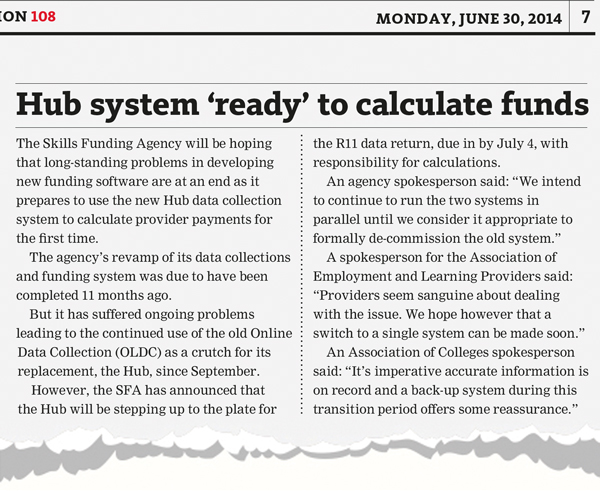The closure of the Skills Funding Agency’s (SFA) online data collection (OLDC) system as a back-up for its breakdown-plagued replacement Hub system has prompted concerns about the lack of a “plan C”.
The OLDC was phased out on Friday (October 31), meaning providers must route all future Individualised Learner Record (ILR) returns data through the Hub — a system which has been fraught with teething problems since its introduction in July.
As reported by FE Week, the Hub has broken down at a critical time at least three times since it started being used.
The SFA previously acknowledged problems in August for R12 returns and also in September, when the Hub broke down on the deadline day for R13. And ongoing issues were reported as recently as last month when providers trying to meet the R14 deadline were hit with crashes.
Providers had been using both systems to make submissions, which meant that returns made through the OLDC were still submitted, even where the Hub failed. But the SFA has confirmed the Hub is now the only system available.
The situation has sparked a wide-ranging debate on the SFA’s FE Connect online forums. Martin West, a freelance consultant and software supplier, said: “This all should be of concern to the sector and I fail to understand why these questions are not being raised at a higher level than this forum.

“I expect that despite our requests that the OLDC should be retained for 14/15 due to the unresolved issues with the Hub, that the OLDC cannot be used as a plan B for 14/15 as it is not set up to do so. This begs the questions does the SFA have a plan C and have the objectives of the data collections and funding transformation project been achieved?”
An SFA spokesperson acknowledged the Hub had not had enjoyed a smooth introduction, and although she sought to reassure providers that technical issues had been resolved quickly, she could offer no information about what failsafe system would operate if problems persisted.
A spokesperson for the Association of Colleges said: “The plan to modernise data collection arrangements is right, but we’ve passed on college concerns about the operations of the Hub to the SFA and have encouraged it to tackle known problems.
“When we last discussed this a few days ago, the Hub seemed to be working more effectively than it had been the previous weekend.”
Stewart Segal, chief executive of the Association of Employment and Learning Providers (AELP), said: “Independent providers, mindful of their cashflow considerations, need to have confidence that the Hub is functioning properly, especially now that the old system has been phased out.
“Providers should be paid in a timely manner for delivery and if there are problems with the Hub, providers should not be penalised as a result. To date, the SFA has reassured AELP that no provider will be disadvantaged in the future with the backup system no longer in place.”
The SFA spokesperson said: “We acknowledge that data collections processes in the 2013 to 2014 funding year did not run smoothly. We acted quickly to resolve any technicalities, when they occurred, and communicated at the earliest opportunity to reassure our users.
“During the 2013 to 2014 data collection year, we have improved our systems and listened to users’ feedback. In the main the systems for the 2014 to 2015 funding year are working well.”








The Hub & FIS have yet to have a completely free trouble-free month since their inception and yet are in their second year of operation. Questions to the SFA or Data Service can take months to be answered at all. Providers are not kept informed in a timely manner and are not listened to as repeatedly exhibited on FeConnect. Payments on Profile are made when the systems do not work and that has been the only saving for many Providers and has been required more times than reasonable. Whilst there may be those who do not feel or appreciate the problems, there are clearly many for whom the new systems have yet to deliver the promised improvements. In the main the systems for the 2014 to 2015 funding year have yet to deliver anything close to what has been suggested above.